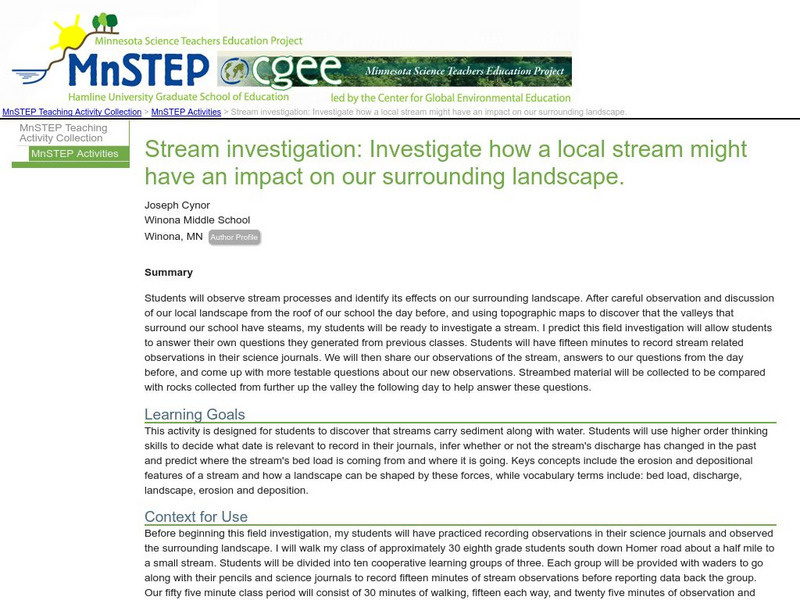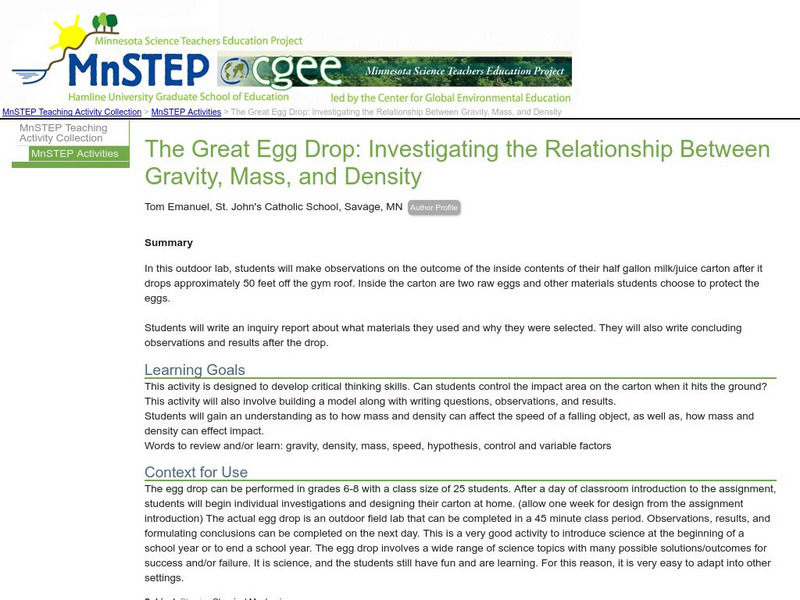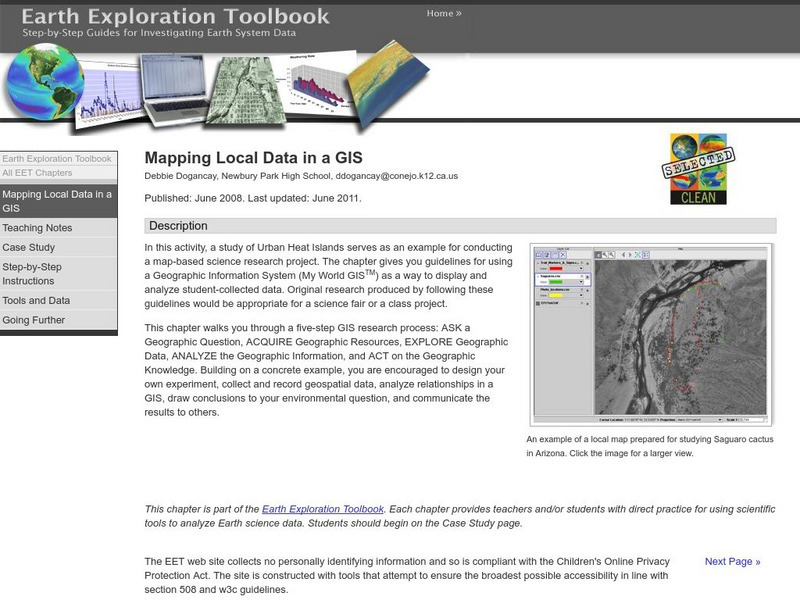Alabama Learning Exchange
Alex: Telling Time to the Hour
This lesson helps children make a connection between the digital and analog clock. In general, the number system is based on units of ten which can sometimes make it difficult for children to realize that time is based on cycles of...
Science Education Resource Center at Carleton College
Serc: Mn Step: Stream Investigation
This is a field study where students investigate the characteristics and processes of local streams to see how they affect the landscape around them, and develop questions that could be investigated. They also collect rock samples from...
Science Education Resource Center at Carleton College
Serc: Mn Step: The Great Egg Drop: Relationship Between Gravity, Mass and Density
An interesting experiment in the relationship between gravity, density, and mass. Students must devise a way to drop a milk carton containing two raw eggs off a roof 50 feet high, without breaking the eggs. They then write a scientific...
Science Education Resource Center at Carleton College
Serc: Mapping Local Data in a Gis
In this activity, students will learn how to conduct a map-based science research project using a Geographic Information System (GIS). They will design an experiment, collect and record geospatial data, analyze geospatial relationships...
Alabama Learning Exchange
Alex: The Circles of Life
This is an inquiry based cooperative learning unit that can be used in biology as a graduation exam review or in botany for a nine week project. The students will learn the life cycle of mosses, ferns, gymnosperms and angiosperms. The...
Alabama Learning Exchange
Alex: The Tennessee Valley Authority and Marshall County
Learners will create computer models based both on contemporary maps and primary sources to explore the role of the Tennessee Valley Authority's hydroelectric projects in altering more than 75 miles of the natural landscape and in...
Alabama Learning Exchange
Alex: Decimal War
Students will use base 10 manipulatives to build models of decimal numbers. Students will compare decimal numbers. This lesson plan was created as a result of the Girls Engaged in Math and Science, GEMS Project funded by the Malone...
Alabama Learning Exchange
Alex: Pass It Down
This lesson, Pass It Down, integrates science and math into two consecutive hands-on genetics activities that should be embedded within an existing genetics unit suitable for biology students. The results of each activity will be...
Alabama Learning Exchange
Alex: Lining Up the Decimals
This lesson plan provides a chance for the young scholars to order decimals from least to greatest and greatest to least. The numbers are based on a student's ability. This lesson plan was created as a result of the Girls Engaged in Math...
Other
Sprk: Orb Basic Lesson 2 [Pdf]
Students will use Sphero to explore the computer science concepts of variables and conditionals (ifstatements). They will use OrbBasic, which is a text-based programming language for the Sphero. They will write a simple program that...
Alabama Learning Exchange
Alex: Souper Scooper
This hands-on, inquiry based activity is an extension of the AMSTI Science Module, Solids and Liquids. Students use nonstandard units to measure beans in a soup mix. Students predict how many beans will be in a scoop. Students group...
Alabama Learning Exchange
Alex: Exponential Growth and Decay
This instructional activity on exponential growth and decay involves a variety of teaching resources. There are a variety of websites used to teach and reinforce how to identify exponential growth or decay and how to solve problems...
Alabama Learning Exchange
Alex: Can You Curl Your Tongue?
This lesson is adapted from a Connected Mathematics Unit, How Likely is It? This investigation introduces biology as a source of applications for probability. In this lesson, Curling your Tongue, students determine how many students in...
Alabama Learning Exchange
Alex: Battle to the Death: Adding Integers
The goal of this lesson is for students to use manipulatives to add integers, creating concepts rather than memorizing rules. This lesson will be related to the 300 Spartans who battled the invading Persians at the Battle of Thermopylae,...











![Sprk: Orb Basic Lesson 2 [Pdf] Lesson Plan Sprk: Orb Basic Lesson 2 [Pdf] Lesson Plan](https://d15y2dacu3jp90.cloudfront.net/images/attachment_defaults/resource/large/FPO-knovation.png)



